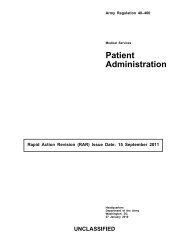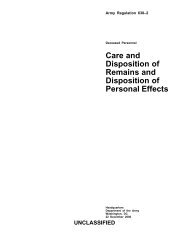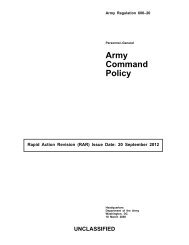Officer Transfers and Discharges - Army Publishing Directorate ...
Officer Transfers and Discharges - Army Publishing Directorate ...
Officer Transfers and Discharges - Army Publishing Directorate ...
Create successful ePaper yourself
Turn your PDF publications into a flip-book with our unique Google optimized e-Paper software.
(2) Provided its function resources by the TOE PSC.<br />
(3) The functional responsibility of the Personnel Operations Branch <strong>and</strong> PPAA work center (<strong>and</strong> their tactical<br />
counterpart).<br />
b. Involuntary transfers <strong>and</strong> discharges will be processed to completion without delay upon initiation by the<br />
comm<strong>and</strong>er.<br />
c. Wartime st<strong>and</strong>ards will be extended or curtailed as follows:<br />
(1) Terms of service will be extended by the President <strong>and</strong>/or Congress through declaration of national emergency<br />
or war.<br />
(2) Transfer <strong>and</strong> discharge authority (voluntary <strong>and</strong> involuntary) will be curtailed by the Secretary of the <strong>Army</strong>.<br />
Section III<br />
Scope<br />
1–12. Eligibility for voluntary separation<br />
a. An officer may request separation from the <strong>Army</strong> under the provisions of this regulation. The appropriate<br />
comm<strong>and</strong>er will ensure that the officer is separated on the date specified in the separation order <strong>and</strong> furnish the<br />
discharge certificate specified by CG, HRC (if appropriate).<br />
b. A request for separation may be disapproved by the approval authority when the—<br />
(1) <strong>Officer</strong> is under investigation or charges.<br />
(2) <strong>Officer</strong> is awaiting result of trial.<br />
(3) <strong>Officer</strong> is being considered for involuntary separation (Department of the <strong>Army</strong> Active Duty Board (DAADB) or<br />
elimination).<br />
(4) <strong>Officer</strong> is absent without leave (AWOL).<br />
(5) <strong>Officer</strong> is under control of civil authorities.<br />
(6) <strong>Officer</strong> is mentally incompetent.<br />
(7) <strong>Officer</strong> is in default with respect to public property or funds.<br />
(8) <strong>Officer</strong> has not fulfilled an active duty service obligation (ADSO) specified in AR 350–100.<br />
(9) <strong>Officer</strong> has not completed an initial USAR AGR tour or when voluntary separation is not in the best interests of<br />
the USAR AGR program.<br />
(10) Secretary of the <strong>Army</strong> determines that existing needs of the Service require delay of favorable separation<br />
action. The retention period will be specified when the decision is made to delay the separation.<br />
(11) President or Congress has declared a period of national emergency or war is imminent or in progress.<br />
c. Voluntary requests for separation under this regulation may be accepted only from an officer who is mentally<br />
competent when the request is submitted. When an officer is medically incapacitated from further military service due<br />
to a physical or mental condition, the officer’s case will be delayed until he or she recovers or the officer is processed<br />
through medical channels.<br />
1–13. Counseling<br />
a. When a commissioned officer or warrant officer (except for chaplains, judge advocates, <strong>and</strong> <strong>Army</strong> Medical<br />
Department (AMEDD) personnel) with less than 10 years active Federal commissioned service (AFCS) submits a<br />
request for a voluntary REFRAD under chapter 2 or an unqualified resignation under chapter 3, the first colonel in the<br />
officer’s chain of comm<strong>and</strong> or supervision will counsel the officer (this is only required when listed in the appropriate<br />
table). The judge advocates, chaplains, <strong>and</strong> AMEDD officers will be counseled by a senior officer of their branch in<br />
the chain of technical supervision or as specifically designated by their branch. If the officer is an RC officer on the<br />
active duty list (ADL) or an AGR officer, <strong>and</strong> the officer is one-time non-select for promotion, then the requirement<br />
for counseling is waived.<br />
b. Counseling will include—<br />
(1) Advice concerning the opportunities available in a military career.<br />
(2) A discussion of the officer’s previously achieved investment in the <strong>Army</strong>.<br />
(3) A determination as to whether the officer has satisfied all applicable service obligations, as computed by HRC.<br />
(4) A determination that the officer is not under investigation or charges, awaiting results of trial, or being<br />
considered for administrative elimination.<br />
(5) A determination that the officer is not AWOL, in the confinement of civil authorities, suffering from a severe<br />
mental disease or defect, or in default in respect to public property or public funds.<br />
(6) Advice encouraging a regular <strong>Army</strong> (RA) officer to accept an appointment in the USAR. An RC officer will be<br />
encouraged to retain commissioned status in the USAR.<br />
(7) Information concerning USAR career opportunities may be obtained from agencies listed in table 1–1.<br />
AR 600–8–24 12 April 2006/RAR 19 November 2008<br />
3
















